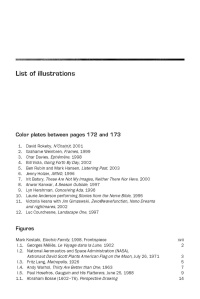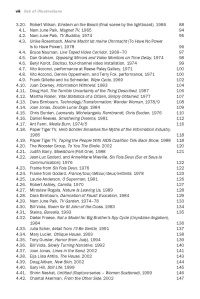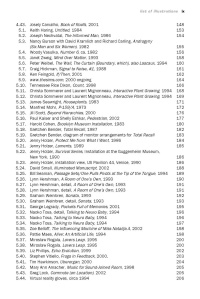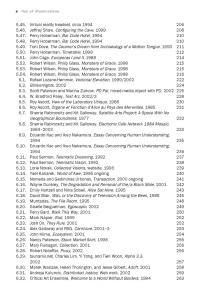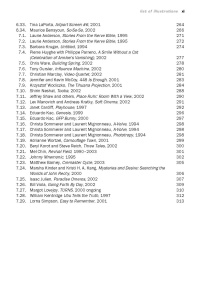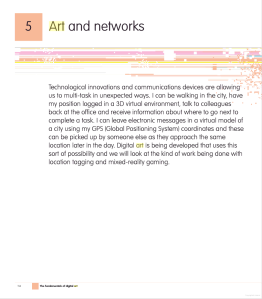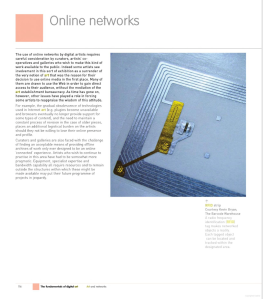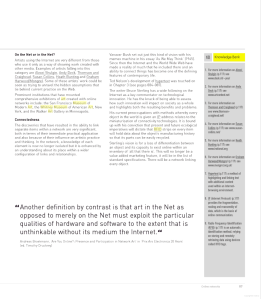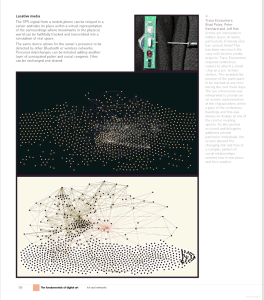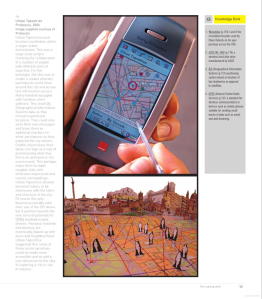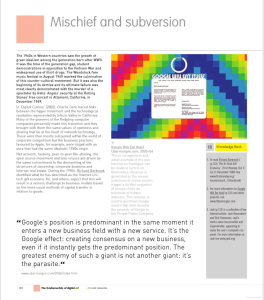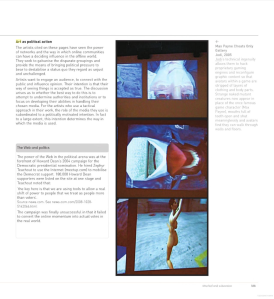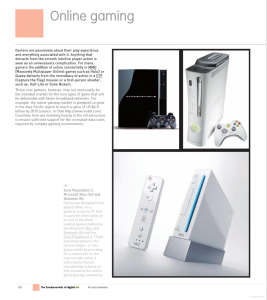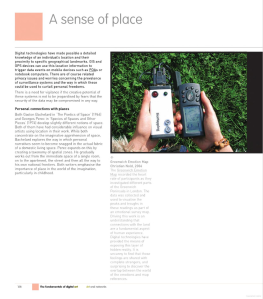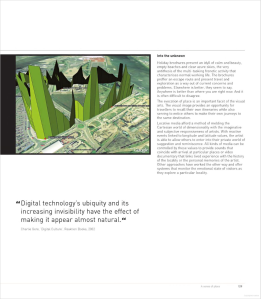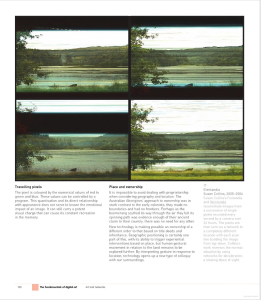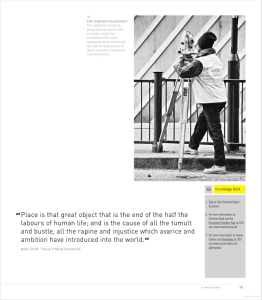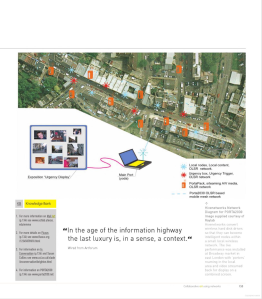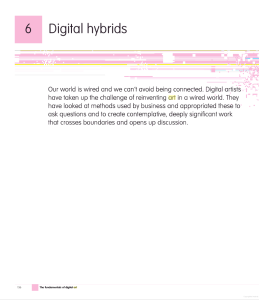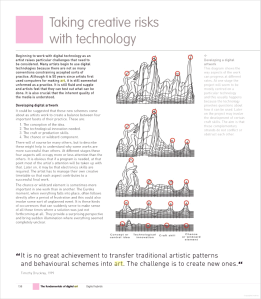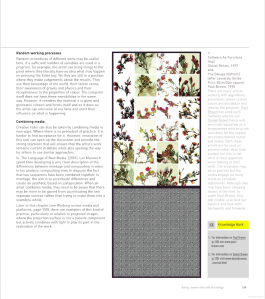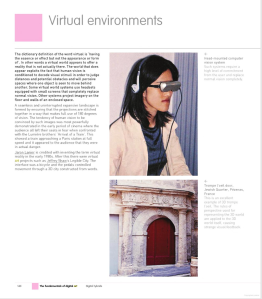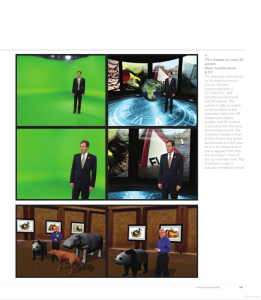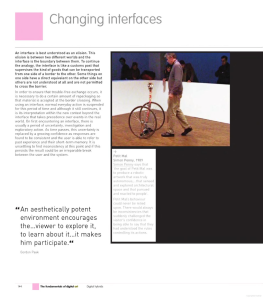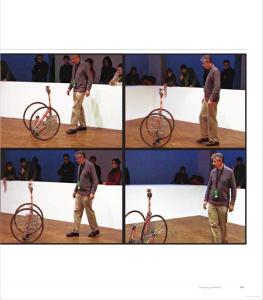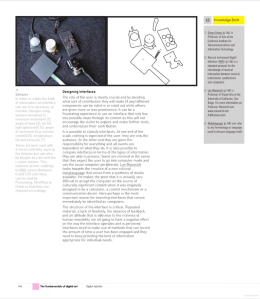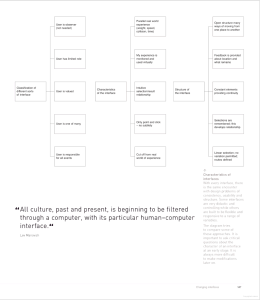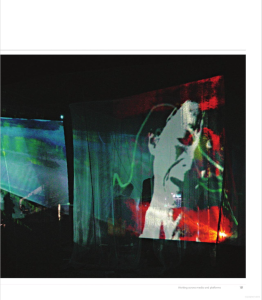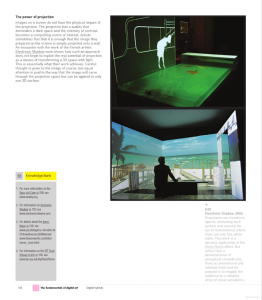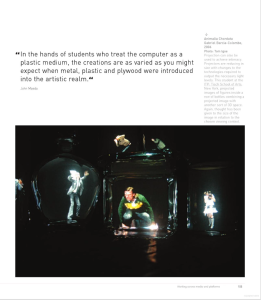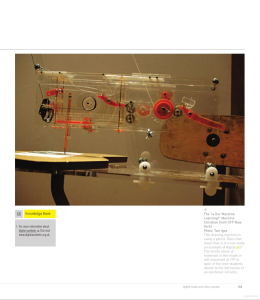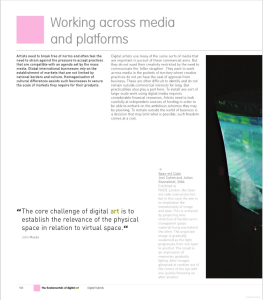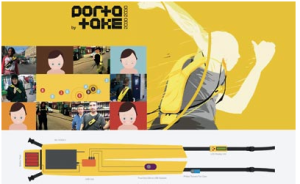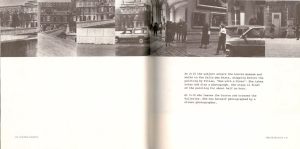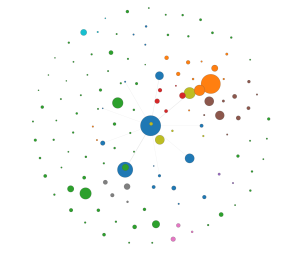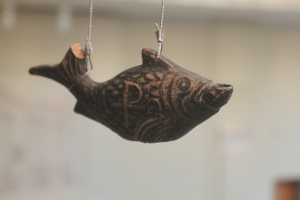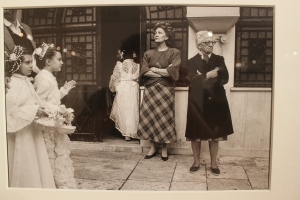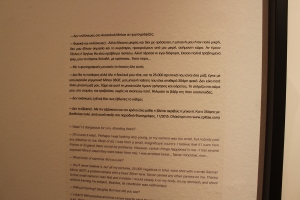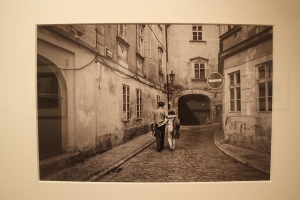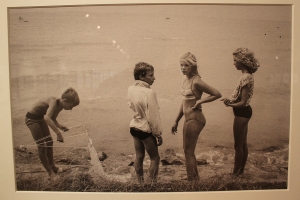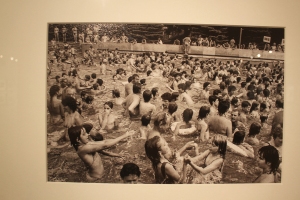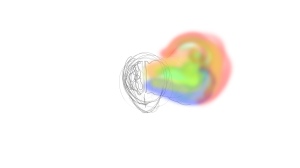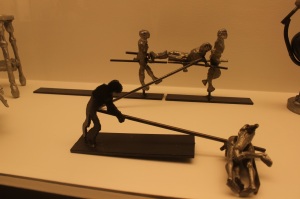30 Οκτωβρίου 2016
LIST OF ILLUSTRATIONS
Video Games & Computer Holding Power by Sherry Turkle
;;;
Video Games & Computer Holding Power by
Sherry Turkle (1984, The New Media Reader, pp. 500-513)
- by 1982 people spent more money on video games than movies & records combined
- video games as an analogy for constructed “rule governed worlds” & simulation
- TV is something you watch, video games are something you do
- comparison of video games to pinball (ancestor): “In pinball you act on the
ball. In Pac-Man you are the mouth.” - concept of identifying with the game character
- first video game: Space War, built at MIT in the early 1960’s (required a super computer)
- Pong – 10 years later / more portable
- Space Invaders / Joust (progression in nature of characters: Pong was just a
marker, these were visually more complex) - advent of adventure games; interactive books
- relationship between fantasy role playing games & computer culture
- video game as altered state; metaphor of meditation/total concentration
- opportunity for perfection
002
[youtube https://www.youtube.com/watch?v=oEZ-WxpBnqE]
[youtube https://www.youtube.com/watch?v=vixm6zGzmRM]
001-ήχοι
[youtube https://www.youtube.com/watch?v=OQMIWcD7d2c?list=PLsfQQdU5b7VTKzqsWP2dq-NSPVH1_KxzQ]
[youtube https://www.youtube.com/watch?v=AtsTiJrY13o?list=PLsfQQdU5b7VTKzqsWP2dq-NSPVH1_KxzQ]
[youtube https://www.youtube.com/watch?v=bCDeulfrayo]
επεξεργασμένοι ήχοι
[youtube https://www.youtube.com/watch?v=-HUWWRqSj0w]
[youtube https://www.youtube.com/watch?v=9I8ivFqh5RI]
28 Οκτωβρίου 2016
Digital Art – Introduction: A Short History of Technology and Art
Computer Art > Multimedia Art > New Media
- art that uses digital technologies as a tool
- art that uses digital technologies as its own medium
Technical History of Digital Art
- limited to military, academic, and consumer cultureo As We May Think by army scientist Vannevar Bush imagined the
first computero Men, Machines and the World Apart by Norbert Wiener - 1946 – ENICA the University of Pennsylvania created the first digital computer
- 1961 – Theodor Nelson coined the terms Hypertext and and Hypermedia to describe texts in which images and sounds could be linked
- 1964 – RAND Corporation (Cold War think tank) conceptualized the internet as a communication network without central authority that could be safe from a nuclear attack
- 1968 – Douglas Engelbart from the Stanford Research Institute created came up with the idea of bitmapping, windows, and direct manipulation through a mouse
o Bitmapping: each pixel of a computer screen is a assigned on/off (0-1). The computer screen could then be divided into a grid of pixels that create a 2D image - 1970’s – Alan Kay of the Xerox Parc in Palo Alto, CA developed the GUI (graphical user interface), and the “desktop” metaphor popularized bu Apple in 1983
Evolution of Digital Art
- developed in connection to Dada and Fluxus: conceptual art has challenged the traditional notions of the art work, audience, and artist
- 1984 – William Gibson coined the term “cyberspace” in his novel Neruomancer
- 1990’s – Digital art began making it’s way into museums and galleries
- digital arts festivals
o ICC (Tokyo, Japan)o ZKM (Karlsruhe, Germany)o Ars Electronica (Linz, Austria)o Transmediale (Berlin, Germany) o SIGGRAPH (Los Angeles, USA)
Εικόνες μιας άλλης Ευρώπης 1985-1989
24 Οκτωβρίου 2016
ΤΑΥΤΟΤΗΤΑ
22 Οκτωβρίου 2016
Mapplethorpe, who primarily worked in the studio, came to prominence in the mid-1970s with portraits of his inner circle of friends and acquaintances, including artists, composers, and socialites. Unlike Arbus, Mapplethorpe used himself as a subject, returning to the self portrait throughout his career.
Mapplethorpe’s oeuvre included photographic portraits, still lives and nudes. He was also known for his sexually explicit images, which depicted the underground gay S&M scene of the mid-1970s. In these controversial works, sexuality takes precedence over social class or distinction of the sitter: examples of this include unknown young men such as Smutty 1980 and Tattoo Artist’s Son 1984.
The British artists Gilbert & George began to photograph casts of young men from London’s East End in the early 1980s. Although works such as Existers 1984 are somewhat ambiguous the young men are elevated to the status of icon through their embodied potency, strength and beauty, the use of photographic panels resembling stained glass windows.
Such depictions of young men aroused considerable hostility among critics, who accused Gilbert & George of being exploitative, and wrongly described the youths as rent boys or East End thugs.
Gilbert & George explored their own identity working as a pair and presenting themselves as ‘living sculpture’, incorporating themselves and their lives into their art, they set out to provoke their viewers, to make them think and question conventions and social taboos. Bruce Nauman, like Gilbert & George, was associated with conceptual and performance art in the 1970s.
Nauman is renowned for his investigation into the human condition through language and the human body. “My work comes out of being frustrated about the human condition. And about how people refuse to understand other people.”
In works such as Setting a Good Corner (Allegory and Metaphor) 1999, Nauman documents his everyday life, where his identity as an individual is informed by ‘place’ and occupation. The menacing nature of the works concern questions of anxiety and alienation. Whilst not ‘overtly’ a political artist Nauman’s work often references the political cultural climate of the late-twentieth and early twenty-first century.
In the late 1970s, Jenny Holzer devised slogans known as Truisms 1977-9, which play on commonly held truths and clichés. A truism is a statement which is obviously true and says nothing new or interesting: A LITTLE KNOWLEDGE CAN GO A LONG WAY. Initially, the Truismswere infiltrated into the public arena via stickers, T-shirts and posters. Later, Holzer started using electronic displays. In 1982 she emblazoned these messages across a giant advertising hoarding in Times Square, New York. The Truismsare deliberately challenging, presenting a spectrum of often-contradictory opinions. Holzer hoped they would sharpen people’s awareness of the ‘usual baloney they are fed’ in daily life.
Protect Protect 2007 forms part of a series of screenprints that reveal sensitive government transcripts relating to America’s intervention in the Middle East. Here Holzer uses a document from the National Security Archive, enlarging a military map and setting it upon a bright background. Holzer’s technique forces us to acknowledge the interpretative power of language, where the words “protect”, “suppress” and “isolate” emanate strongly against the image of a deeply divided and segregated Iraq.
Andy Warhol’s celebrity portraits and films often incorporated those from his social scene, including his associates from his studio, The Factory.
The celebrities and factory stars of these artworks such as Liz 1965 are not just a celebration of celebrity but are tinged with tragedy, especially the images of women such as Elizabeth Taylor, Marilyn Monroe and Jacqueline Kennedy. The stars themselves were often associated with misfortune and the works both pre-empt the obsessive nature of celebrity and reflect on the negative connotations of life in the public eye. His society portraits, like those of Mapplethorpe, represent not just the society that he himself inhabited but also wider popular culture and many subcultures.
The polaroid, A Self-Portrait with Fright Wig 1986, is one of several that Warhol took in preparation for a series of large-scale paintings commissioned by Anthony d’Offay for an exhibition at his London gallery in 1986. In the photographs, and subsequently transferred into the paintings, Warhol’s skull-like head is isolated from his body, floating against a dark background. This composition bears striking similarities to a Robert Mapplethorpe photographic portrait of Warhol from the same year. In both, Warhol wears his famous silver wig, but, in this Polaroid, the hair stands on end in an almost manic fashion. His eyes seem to be fixated on something to the left, behind the viewer, creating a distinct feeling of uneasiness. This series of self-portraits was the last Warhol completed before his death in 1987.
Richter and Grimonprez appropriate objects and images into their artwork to construct identities as does Ellen Gallagher, much of whose work is informed by her Irish and African-American heritage. Gallagher’s paintings and mixed media collages often question racial stereotypes and appropriate references to the physical divisions in race.
18 Οκτωβρίου 2016
17 Οκτωβρίου 2016
Ταυτότητα (Άσκηση 1 φωτογραφίες)
Η ταυτότητα μας μέσα από τον τρόπο που αντιλαμβανόμαστε το σώμα μας.
Αν σκευτούμε οτι χωρίς την βοήθεια του καθρέφτη ή της φωτογραφίας ή κάποιου άλλου μέσου, βλέπουμε συγκεκριμένα μέρη του σώματος μας, όπως τα χέρια, τα πόδια η κοιλιά και μάλλον σε συγκεκριμένες στάσεις. Πόσο αυτό συμβάλλει στην εικόνα που δημιουργούμε για τον εαυτό μας.
Η εικόνα που έχουμε για τον εαυτό μας μάλλον δεν είναι κάτι παγειωμένο.
Κάθε μέρα για όλη μας την ζωή βλέπουμε τα πόδια τα χέρια μας λίγο την κοιλιά μας ίσως με λίγη προσπάθεια την πλάτη μας και ταυτόχρονα μπορούμε να τα αισθανθούμε. Όχι όμως το κεφάλι μας, τον λαιμό μας, τον ώμο μας
τα σημεία αυτά ξέρουμε ότι υπάρχουν μέσα απο την αντανάκλαση μας ή συγκρίνωντας τον εαυτό μας με τους γύρω μας. Οπότε για να αντιλφθούμε ολόκληρο το σώμα μας συμβάλλουν και εξωτερικοί παράγοντες. Γνωρίζουμε το σώμα μας παρατηρόντας έξω απο μας.
Και όπως όλοι γνωρίζουν, ο καθρέφτης είναι σύμβολο της ψευδαίσθησης, τόσο άυλο όσο και η προβολή ενώς φιλμ (…). Ο καθρέφτης υπόσχεται υπερβολικά πολλά και δίνει υπερβολικά λίγα, είναι ένας βόρβορος ιδεών ή νεοπλατωνικών αρχετύπων, που προκαλεί βδελυγμία στον ρεαλιστή. Είναι μια μάταιη παγίδα, μια άβυσσος.
Robert Smithson, 4 κείμενα, Εκδόσεις ΤΟΠΟΒΟΡΟΣ, Μετάφραση: Νάντια Καλαρά
Ο κινηματογραφικός ηθοποιός, γράφει ο Πιραντέλο, νιώθει εξόριστος. Εξόριστος όχι μόνο από την σκηνή άλλα και από το ίδιο του το πρόσωπο. Με αδιόρατη δυσφορία νιώθει το ανεξήγητο κενό που δημιουργείται καθώς το σώμα του χάνει την υλικότητα του, εξατμίζεται στρερείται την πραγματικότητα, τη ζωή, τη φωνή του και τους ήχους που παράγει ενόσω κινείται, για να μεταβληθεί σε βουβή εικόνα, που τρεμοπαίζειγια μια στιγμή στο πανί και ύστερα χάνεται στη σιωπή (…).
Walter Benjamin, Το έργο τέχνης στην εποχή της τεχνολογικής αναπαραγωγιμότητας, Εκδόσεις επέκεινα, Μετάφραση-Σχόλια Φώτης Τερζάκης
http://kaboomzine.gr/ti-simeni-lipon-fantasiako-meros-v-lakan/
http://www.psychikiygeia.gr/uploads/editorfiles/files/%CE%BD-%CE%BC_%CE%95%CF%85-_%CE%95_%CE%96-%CE%B3-__%CE%92%CF%86_%CE%97_%CE%95_%20(1).pdf
[youtube https://www.youtube.com/watch?v=PckSyDwwfJQ]
